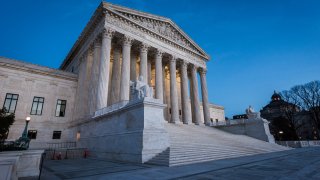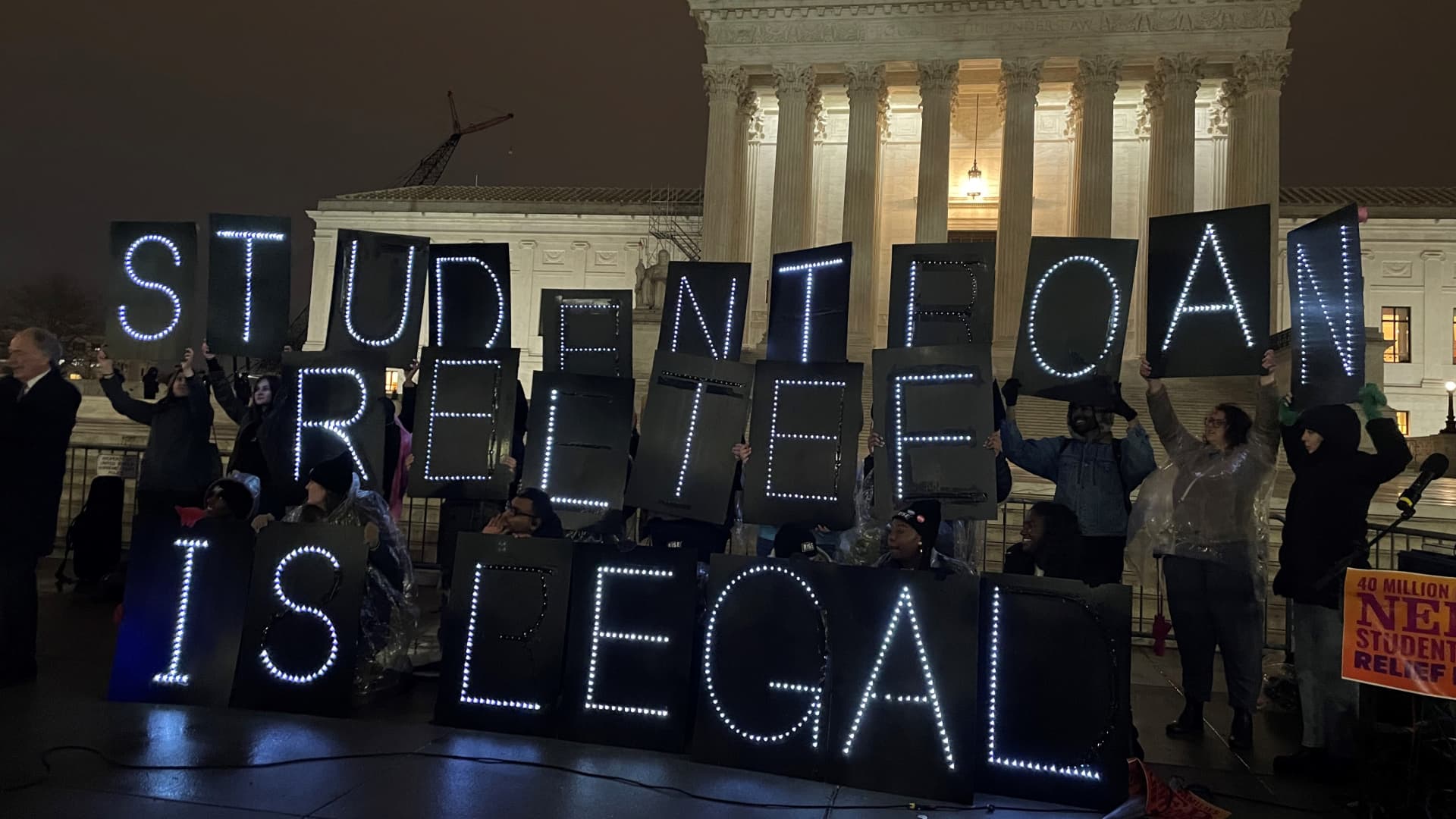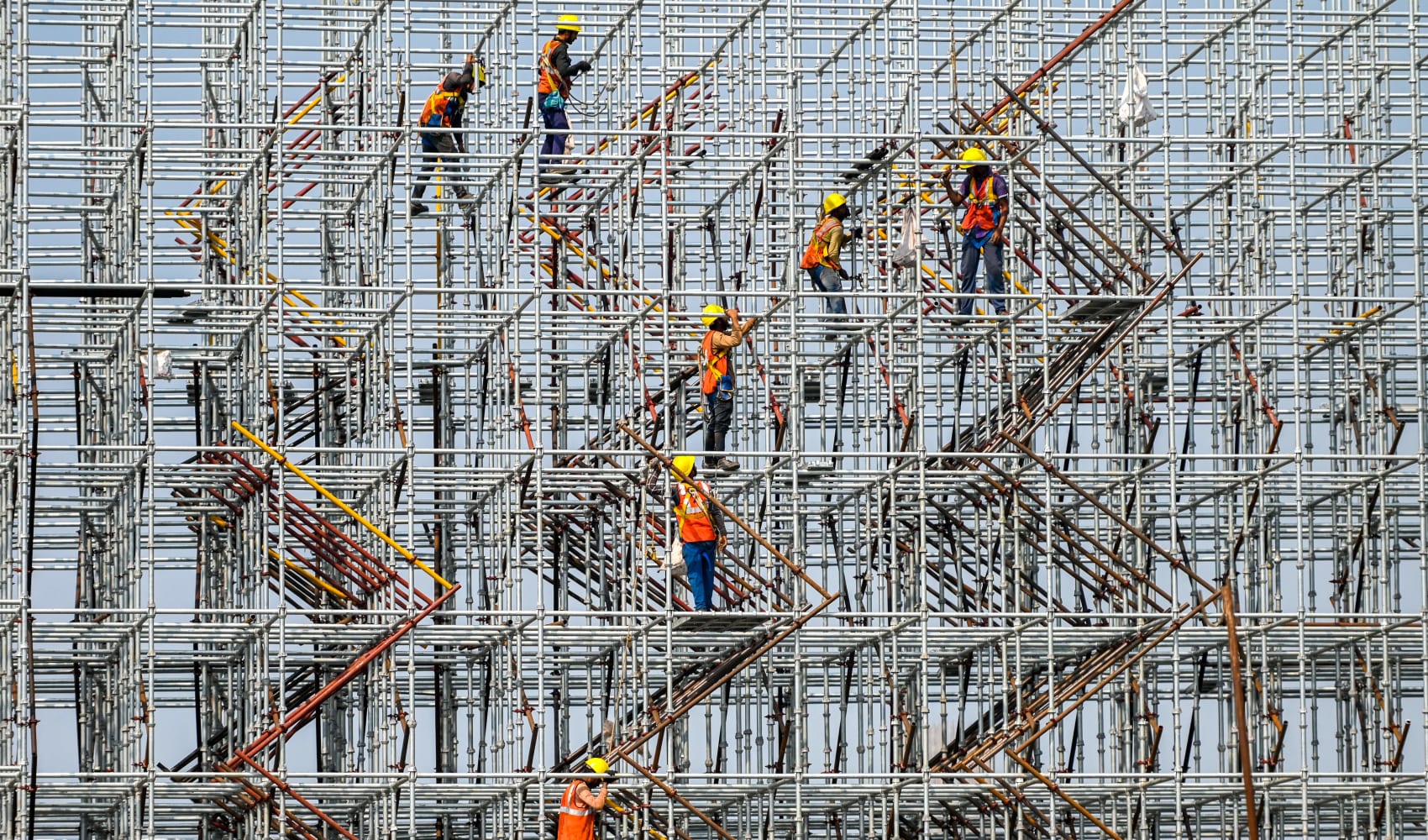
- The Supreme Court is expected to issue its ruling on the Biden administration's student loan forgiveness plan this month.
- Here's what is at stake in the ruling, and the issues being debated.
The Supreme Court is expected to issue a ruling on the Biden administration's student loan forgiveness plan this month. That decision will play a role in shaping the financial futures of 40 million Americans.
If the justices greenlight President Joe Biden's relief, many borrowers will immediately get $20,000 of their student debt cancelled – if they'd received a Pell Grant in college, a type of aid available to low-income families – and as much as $10,000 if they didn't.
Some 14 million people would emerge student debt-free from the plan, potentially making it easier for them to buy a first home, for example, start a family, or open a business.
Get South Florida local news, weather forecasts and entertainment stories to your inbox. Sign up for NBC South Florida newsletters.
More from Personal Finance:
Social Security cost-of-living adjustment may be 2.7% in 2024
Here's the inflation breakdown for May 2023, in one chart
The rich often misjudge the potency of their retirement savings
"The decision would be potentially life changing," said Corey Shirey, 28, who's studying to be a pastor in Oklahoma and owes around $25,000.
Richelle Brooks, a single mother in Los Angeles who had a monthly student loan payment as high as $1,200 at one point, said she's been tied to her phone all of June.
Money Report
"Waiting to hear whether or not it will pass is nerve-wracking at best, debilitating at worst," said Brooks, 35.
Here's what we know about the Supreme Court's deliberation over the plan, as of now.
1. Decision is expected before July
Borrowers shouldn't be stuck waiting on the justices too much longer.
A ruling from the high court should come by early July, before their term ends for summer recess, said higher education expert Mark Kantrowitz.
"The court is likely to issue a decision before the end of June, probably on a Thursday," Kantrowitz said, noting that that was the day of the week the justices had recently been publishing their opinions.
You'll be able to read the ruling on the Supreme Court's website, likely some time in the morning of decision day.
2. Presidential power to cancel debt in question
At an estimated cost of about $400 billion, Biden's plan to forgive student debt is one of the most expensive executive actions in history. The justices are likely examining whether or not the president has the power to implement such a sweeping policy.
The Biden administration insists that it's acting within the law, pointing out that the Heroes Act of 2003 grants the U.S. secretary of education the authority to make changes to the federal student loan system during national emergencies. The country was operating under an emergency declaration due to Covid-19 when the president rolled out his plan.
Opponents of the debt jubilee say the administration is incorrectly using the law, which was passed after the Sept. 11 terrorist attacks and granted relief to impacted borrowers.
"It is not an across-the-board, get-out-of-debt provision that an administration can invoke at will," six Republican-led states wrote in their lawsuit against the plan.
Despite the large scale of the president's policy, the lawyer who argued on behalf of the Biden administration at the Supreme Court, Solicitor General Elizabeth Prelogar, was adamant he was acting squarely within the law's scope to avoid borrower distress during national emergencies.
"There hasn't been a national emergency like this in the time that the Heroes Act has been on the books that's affected this many borrowers," Prelogar said during oral arguments at the end of February. "And so I think it's not surprising to see in response to this once-in-a-century pandemic."
A top Education Department official recently warned that resuming student loan bills without Biden's loan cancellation could trigger a historic rise in delinquencies and defaults. Those payments remain on hold from a pandemic-era policy that began in March 2020.
3. Issue of 'legal standing' could save plan
The Biden administration's forgiveness application had been open for less than a month when a slew of legal changes forced them to shut it. Biden's plan has now faced at least six lawsuits from Republican-backed states and conservative groups.
Two of those legal challenges made it to the Supreme Court: one brought by six GOP-led states — Arkansas, Iowa, Kansas, Missouri, Nebraska and South Carolina – and another backed by the Job Creators Network Foundation, a conservative advocacy organization.
Some experts believe the justices could reject the lawsuits against the president's plan because the plaintiffs failed to prove they'd be harmed by the policy, which is typically a requirement to gain the right to sue.
The six GOP-led states argued that Biden's loan forgiveness plan would be a financial setback for them because of a reduction in business among the companies that service federal student loans in their states.
They said the decreased revenue for MOHELA, or the Missouri Higher Education Loan Authority, could leave the agency unable to meet its financial obligations to Missouri.
However, consumer advocates and legal experts said that charge was based on "false facts" and pointed out that MOHELA's revenue was actually expected to increase because of some student loan servicers recently leaving the space and it picking up extra accounts.
The justices also were perplexed as to why the servicers weren't bringing their own challenges, and how the states could claim harm on their behalf.
"Do you want to address why MOHELA's not here?" Justice Amy Coney Barrett asked during the oral arguments.
"MOHELA doesn't need to be here because the state has the authority to speak for them," Nebraska Solicitor General James A. Campbell said.
Barrett wasn't satisfied by that answer.
"Why didn't the state just make MOHELA come then?" she asked. "If MOHELA is really an arm of the state...why didn't you just strong-arm MOHELA and say you've got to pursue this suit?"
A request from CNBC for comment from the Nebraska attorney general was not immediately answered.

In the second legal challenge backed by the Job Creators Network Foundation, the lawyers argued that two plaintiffs, Myra Brown and Alexander Taylor, were deprived of their "procedural rights" by the Biden administration because it didn't allow the public to formally weigh in on the shape of its plan before it rolled it out. As a result, the lawyers say, Brown and Taylor were either partially or fully excluded from the relief.
Elaine Parker, president of Job Creators Network Foundation, insisted their plaintiffs suffered harm from the policy.
"If the administration had gone through notice-and-comment as the law requires, they each could have made their case," Parker said. "The program is a clear act of executive overreach."
The Heroes Act, however, exempts the need for a notice-and-comment period during national emergencies, Kantrowitz said. Also, not getting loan forgiveness or not getting as much as others is not the same as being harmed, he added.
"The Supreme Court is likely to be very critical of the circular arguments made by the plaintiffs in the JCN case," Kantrowitz said. "You have to look at the law cross-eyed to argue for legal standing."






